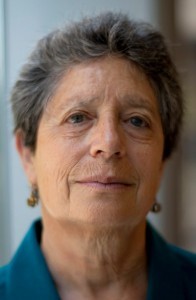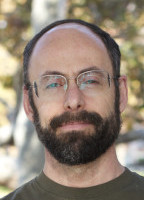FPR-UCLA Sex & Gender Conference 2015
A Critical Moment: Sex/Gender Research at the Intersections of Culture, Brain, and Behavior
October 23–24 (Fri–Sat), 2015 | Neuroscience Research Building | 635 Charles E. Young Drive South, UCLA
A Critical Moment: Sex/Gender Research at the Intersections of Culture, Brain, and Behavior
October 23–24 (Fri–Sat), 2015 | Neuroscience Research Building | 635 Charles E. Young Drive South, UCLA
 Sari van Anders, PhD
Sari van Anders, PhDSari van Anders, PhD, is Associate Professor of Women’s Studies and Psychology at the University of Michigan, and Affiliate Faculty in Neuroscience, Reproductive Sciences, the Biosocial Methods Collaborative, and Science, Technology, and Society. Dr. van Anders is Editor of the Annual Review of Sex Research, and on the editorial boards of four other journals related to sexuality, gender, and/or evolution. Dr. van Anders studies social modulation of hormones, sexuality and intimacy, and gender/sex and sexual diversity, using a feminist science lens, and has published over 60 papers related to these topics. Dr. van Anders was named a “Scientist to Watch” by The Scientist magazine in 2014, and has won multiple awards for this research program, including the Association for Psychological Science’s 2013 Janet Taylor Spence Award for Transformative Early Career Contributions, the 2014 Society for Behavioral Neuroendocrinology’s Frank Beach Early Career Award, and the Society for the Scientific Study of Sexuality’s 2012 Ira and Harriet Reiss Theory Award. Dr. van Anders’ work is supported by grants from the National Institutes of Health, the Canadian Institute of Health Research, and various other private and university sources. Dr. van Anders’ current work focuses on how various forms of intimacy and gendered behavior modulate testosterone (grounded in the Steroid/Peptide Theory of Social Bonds, van Anders et al., 2011), conceptualization of sexual diversity (grounded in Sexual Configurations Theory, van Anders, 2015), and other projects related to sexuality, hormones, and feminist science using multiple methods ranging from experiments to qualitative interviews. Dr. van Anders also founded and edits GapJunctionScience.org, a website about feminist science.
 Art Arnold, PhD
Art Arnold, PhDThe Arnold lab studies biological factors that make males and females different. Many diseases affect the two sexes differently, but the factors that cause the sex differences are poorly understood. Because one sex is often protected from a disease, it makes sense to identify the mechanisms underlying the sex difference as one strategy to find factors that are protective. These factors might be targets for novel therapies.
Most sex differences in physiology and disease are caused by sex hormones coming from the testes or ovaries. We have found, however, that some sex differences also are caused by genes on the sex chromosomes that act outside of the gonads. We are interested in constructing a general theory of sex determination and sexual differentiation that applies to any tissue.
We have used several animal models that offer significant advantages for understanding the factors that cause sex bias in physiology. One is the Four Core Genotypes model, in which the type of the gonad of the animal (testes or ovaries) is not related to its complement of sex chromosomes (XX or XY). This model allows comparing mice that have different sex chromosomes but the same type of gonad, to find traits that are influenced by the complement of sex chromosomes.
Sex and Systems Biology — We are interested in understanding the sexome, which is the sum of all sex-biased influences on gene networks and cell systems, studied globally.
 Tom Boellstorff, PhD
Tom Boellstorff, PhDTom Boellstorff (Ph.D., Anthropology, Stanford, 2000) is Professor in the Department of Anthropology at the University of California, Irvine. From 2007–2012 he was Editor- in-Chief of American Anthropologist, the flagship journal of the American Anthropological Association; he currently sits on the editorial boards of many journals, including Cultural Anthropology, Games and Culture, and Sexualities. With Bill Maurer, he is Series Editor for the Princeton Studies in Culture and Technology (Princeton University Press). His research projects have focused on questions of digital culture, sexuality, globalization, nationalism, language, and HIV/AIDS. He is the author of The Gay Archipelago: Sexuality and Nation in Indonesia (Princeton University Press, 2005), winner of the 2005 Ruth Benedict Award from the Society of Lesbian and Gay Anthropologists; A Coincidence of Desires: Anthropology, Queer Studies, Indonesia (Duke University Press, 2007); and Coming of Age in Second Life: An Anthropologist Explores the Virtually Human (Princeton University Press, 2008), winner of the Media Ecology Association’s 2009 Dorothy Lee Award for Outstanding Scholarship in the Ecology of Culture, and Honorable Mention for the 2008 PROSE Award for Professional and Scholarly Excellence in Media and Cultural Studies, Association of American Publishers. He is also the coauthor of Ethnography and Virtual Worlds: A Handbook of Method (Princeton University Press, 2012), co-editor of Speaking in Queer Tongues: Globalization and Gay Language (University of Illinois Press, 2004), co-editor of a theme issue of Ethnos, “Bodies of Emotion: Rethinking Culture and Emotion through Southeast Asia” (Volume 69:4, 2004) and co-editor of a theme issue of Anthropological Forum, “East Indies/West Indies: Comparative Archipelagos” (Volume 16:3, 2006).
 Monique Borgerhoff Mulder, PhD
Monique Borgerhoff Mulder, PhDI am a human behavioural ecologist working on projects relating to life history, conservation, and global patterns of cultural variation. HBE-ers explore the big “Why” questions about our species, such as why do people marry, what is the basis of gender roles in economic and social behaviour, why has fertility dropped so radically in most parts of the world, why are people such poor conservationists of natural resources, and many others. I worked on these topics recently as a fellow at the Wissenschaftskolleg zu Berlin. I have three major foci of interest.
First, I do fieldwork in East Africa, both alone and with students, investigating issues relating to human life history variation, fertility, marriage, inheritance, divorce, sexual conflict, health and household economics; my current behavioural ecological research focuses on Rukwa villages in western Tanzania. Second I co-coordinate collaborative projects on intergenerational transmission of wealth and inequality and on polygyny at the Santa Fe Institute with Sam Bowles. Third I conduct comparative studies of the efficacy of different strategies for conserving biodiversity and mitigating poverty in the developing world, building on Conservation: Linking Ecology, Economics and Culture (Princeton University Press 2005); these interests have led to my co-founding of a monitoring and evaluation NGO (Savannas Forever: Data for Development) and to a new project on cooperation and carbon trading on Pemba (Zanzibar). I also edit a book series on the Origins of Human Behavior and Culture with Joe Henrich at the University of California Press.
 Carole H. Browner, PhD, MPH
Carole H. Browner, PhD, MPHAs a sociocultural anthropologist, my research interests lie principally at the intersection of gender, reproduction, and health. One major focus has been to explicate the ways that gender-based power relations shape women’s and men’s reproductive behavior.
My research sites have included urban Colombia, rural Mexico, and the U. S. In Cali, Colombia I investigated the circumstances that led pregnant women with unintended conceptions to seek illegal abortion. In rural Mexico, I sought to understand how local political relations shape gender-based reproductive strategies. Since 1989, I have worked mainly in the U. S. on issues surrounding the medicalization of pregnancy and prenatal care, particularly the ways that prenatal genetic information may alter reproductive experience. My prize-winning collection, Reproduction, Globalization and the State: New Theoretical and Ethnographic Perspectives (with Carolyn Sargent) was published in 2011 by Duke University Press.
Another line of investigation has focused on the growing role of genetic testing in the field of neurology. My monograph, Neurogenetic Diagnoses, the Power of Hope, and the Limits of Today’s Medicine, co-authored with Mabel Preloran (Routledge, 2010), explores the diverse meanings and impacts of genetic diagnoses for patients enduring incurable, ultimately fatal neurodegenerative diseases – and for their family caregivers and clinicians. The analysis is framed by increasingly sharp social debates over the consequences of decoding the human genome – and the impact of genetic technology on our lives.
Current research focuses on the use and misuse of genetic testing for the diagnosis of neurological diseases in the U.S. and Mexico, and the structural, economic, cultural and psychological barriers to care faced by families with children born with craniofacial deformities in northern Mexico.
More info at http://www.sscnet.ucla.edu/anthro/faculty/browner
 Karen Devries, BSc, PhD
Karen Devries, BSc, PhDI am a social epidemiologist at the Gender, Violence and Health Centre. My main interests relate to violence against children and women, mental health, sexual health, and epidemiological methods. My current work consists of several intervention trials and evidence synthesis projects. I am currently leading a cluster RCT in Uganda to evaluate the Good School Toolkit for prevention of violence against children attending primary schools, with partners at the Institute of Education, Makerere University, and Raising Voices. I am also conducting related work on child protection in East Africa with various partners. I coordinate the GVH Centre’s involvement in Global Burden of Disease Study, and produce estimates of the prevalence of and disease burden associated with intimate partner violence and childhood sexual abuse for every region of the world. I also coordinated SASA!, a cluster-randomised trial of a violence and HIV prevention intervention in Kampala, Uganda.
More info at http://www.lshtm.ac.uk/aboutus/people/devries.karen…
 Lisa M. Diamond, PhD
Lisa M. Diamond, PhDMy research focuses on two distinct but related areas — the nature and development of affectional bonds and the nature and development of same-sex sexuality. The common thread uniting these lines of research is my interest in the psychological and biobehavioral processes underlying intimate relationships and their influence on emotional experience and functioning over the life course.My primary research questions are as follows: (1) what are the basic psychological and biobehavioral processes underlying the formation and functioning of affectional bonds; (2) how are these processes related to sexual desire and sexual orientation; (3) what are the implications of affectional bonding for mental and physical well-being at different stages of life? In addressing these questions, I use a diverse range of research methods, including in-depth qualitative interviews, controlled social-psychophysiological experiments, and assessment of naturalistic interpersonal behavior.
 Anne Fausto-Sterling, PhD
Anne Fausto-Sterling, PhDDr. Anne Fausto-Sterling is the Nancy Duke Lewis Professor Emerita of Biology and Gender Studies in the Department of Molecular and Cell Biology and Biochemistry at Brown University, and former director of the Science & Technology Studies Program at Brown University.
Dr. Fausto-Sterling has achieved recognition for works that challenge entrenched scientific beliefs while engaging with the general public. She is the author of several acclaimed books that are referenced widely in feminist and scientific inquiry, as well as scientific publications in developmental genetics and developmental biology.
Her current research on gender and mother-infant interactions applies developmental systems approaches to understanding how gendered behaviors and preferences might emerge from undifferentiated systems.
 Daniel Fessler, PhD
Daniel Fessler, PhDI am an evolutionary anthropologist whose principal focus is contemporary humans. Combining anthropological, psychological, and biological theories and methods, I approach a variety of aspects of human behavior, experience, and health from an integrative perspective in which humans are viewed as both the products of complex evolutionary processes and the possessors of acquired cultural idea systems and behavioral patterns.
My research, itself an ever-evolving process, currently focuses on a number of domains, including: emotions; disease avoidance; morality; prosociality and cooperation; conflict, aggression, and risk-taking; cultural transmission; food and eating; and sex and reproduction.
 Matthew Gutmann, PhD, MPH
Matthew Gutmann, PhD, MPHMatthew Gutmann is Professor of Anthropology, Director of the Brown International Advanced Research Institutes (BAIRI), and Faculty Fellow at the Watson Institute for International Studies at Brown University. As a scholar, his research and teaching has focused on studies of men and masculinities; public health; politics; and the military. HIs published books include The Meanings of Macho: Being a Man in Mexico City (also in Spanish and Portuguese editions); The Romance of Democracy: Compliant Defiance in Mexico City (also in Spanish and Chinese editions); Fixing Men: Sex, Birth Control and AIDS in Mexico (also in Spanish edition); and Breaking Ranks: Iraq Veterans Speak out against the War (with Catherine Lutz). With Jeffrey Lesser he is editing the University of California Press Global Square book series. Most of his ethnographic research has been conducted in Mexico where he is a visiting professor at Colegio de México, and he recently began new research in Shanghai where he is a visiting professor at the Shanghai Theater Academy. At present he is working on three projects: Global Latin America (an edited volume with Jeffrey Lesser); Men Are Animals; and Global Affinities. From 2009 to 2013, he was Vice President for International Affairs at Brown, leading the University’s efforts to build collaborations and exchanges with leading institutions around the world and major programs relevant to internationalization. Gutmann has a Master’s in Public Health, and in 2008 he won the Eileen Basker Memorial Award for the best scholarly study on gender and health. He has also been a visiting professor in China, France, Mexico, and Spain. In addition to working in Latin America for the last two decades, Gutmann’s undergraduate major was modern and classical Chinese.
 Gilbert Herdt, PhD
Gilbert Herdt, PhDGilbert Herdt has an international profile and distinction that spans the United States, Australia, the Pacific Islands, and Western Europe through more than thirty years’ research, teaching, policy and clinical studies. Herdt is a graduate of Sacramento State College, the University of Washington, the Australian National University, and UCLA. He was a Fulbright Scholar to Australia (1974-78), an individual NIMH Scholar at UCLA’s Neuropsychiatric Institute, and has been the recipient of Guggenheim, NEH, and Rockefeller Foundation fellowships. He has taught at Stanford University, University of Chicago, and San Francisco State University (SFSU). He has held major grants from the NIMH, Spencer Foundation, Ford Foundation, and others.
Herdt founded the Department of Sexuality Studies and the Master of Arts in Human Sexuality Studies at SFSU, the first in the nation. He is the founder of the University of Amsterdam Summer Institute on Sexuality and Culture and SFSU’s Summer Institute on Sexuality, Health and Society (2001-2010). His publications include thirty-five books, monographs, and anthologies, and more than one hundred scientific papers. Herdt continues to conduct fieldwork among the Sambia and is a champion of sexual literacy and human rights in Pacific Island countries.
 Melissa Hines, PhD
Melissa Hines, PhDI study gender development, and am particularly interested in how prenatal influences (e.g., gonadal hormones) interact with postnatal experience to shape brain development and behaviour. My current research programme includes studies of individuals with disorders of sex development (formerly called intersex conditions), as well as healthy individuals for whom we have measures of prenatal hormones. Behavioural outcomes of interest include gender identity, sexual orientation, aggression, empathy, mood, sex-typical interests in childhood (e.g., toy preferences) and adulthood, and clinical syndromes that show sex differences. I also study infants, so that we can identify sex differences as they emerge early in life and examine their relationship to prenatal hormones and postnatal socialization. In addition, I am interested in the neural and cognitive mechanisms related to behavioural changes in these areas, as well as in animal models of human behavior.
 Kathy Huang, MA
Kathy Huang, MAKathy Huang’s career as a filmmaker began in the dusty fields of South Texas. Inspired by her experiences teaching at-risk youth in a rural high school, she produced her first documentary Scribble’s Creations (2004). Shot with the help of her former students, the film follows a teenager coming of age along the US-Mexico border. Since then, Kathy has continued to work with different communities to document social and humanitarian issues. Her subjects have included a charismatic drag king in San Francisco, a young veteran suffering from post-traumatic stress, and a Chinese-American beauty pageant contestant. She recently completed her first feature documentary, Tales of the Waria (2011). The ITVS-funded project follows a community of transgender women in Indonesia, the world’s most populous Muslim country, as they search for love and happiness. Four years in the making, the film premiered to sold-out audiences in San Francisco and Los Angeles, and garnered several Audience Choice Awards. The Advocate called it “a fascinating exposé” and Jezebel.com noted that the film’s “beauty and honesty are heartbreaking.” The film received a national broadcast on PBS in June 2012.
Kathy received a Bachelor’s in History from Harvard University and a Master’s in Documentary Film Production from Stanford University. SShe is currently at work on A Guangzhou Love Story, an ITVS-backed project about the growing trend of marriages in China between African migrants and Chinese women.”
 Marcia Inhorn, PhD, MPH
Marcia Inhorn, PhD, MPHMarcia C. Inhorn, PhD, MPH, is the William K. Lanman, Jr. Professor of Anthropology and International Affairs in the Department of Anthropology and The Whitney and Betty MacMillan Center for International and Area Studies at Yale University. A specialist on Middle Eastern gender, religion, and health, Inhorn has conducted research on the social impact of infertility and assisted reproductive technologies in Egypt, Lebanon, the United Arab Emirates, and Arab America over the past 30 years. She is the author of five books on the subject, including her latest, Cosmopolitan Conceptions: IVF Sojourns in Global Dubai (Duke University Press, 2015). She is also the (co)editor of nine books, the founding editor of the Journal of Middle East Women’s Studies (JMEWS), and co-editor of the Berghahn Book series on “Fertility, Reproduction, and Sexuality.” She has served as president of the Society for Medical Anthropology of the American Anthropological Association; on the Board of Directors of the Middle East Studies Association; and as director of Middle East centers at both Yale and University of Michigan. Inhorn has received numerous awards for her books and scholarship, including the American Anthropological Association’s Robert B. Textor and Family Prize for excellence in anticipatory anthropology, the AAA’s Eileen Basker and Diana Forsythe Prizes for outstanding anthropological research in gender, health, and biomedical technology, the JMEWS Book Award in Middle East gender studies, and the Middle East Distinguished Scholar award from the AAA’s Middle East Section. She has also received the Graduate Mentor Award from the Society for Medical Anthropology’s Student Association. Currently, Inhorn is writing a book on Arab refugee reproductive health, which is under contract with Stanford University Press. She is also conducting a two-year National Science Foundation-funded research study on oocyte cryopreservation (egg freezing) for both medical and elective fertility preservation.
 Hillard Kaplan, PhD
Hillard Kaplan, PhDMy research examines the evolution of the human life course. This work has at various times focused on food sharing, fertility decisions, parental investment, sex roles, subsistence behavior, intelligence, and life span.
My empirical work draws on fieldwork with a number of populations including the Ache (Paraguay), Mashco-Piro (Peru), Yora/Yaminahua (Peru), Machiguenga (Peru), and Xhosa (South Africa). My past work on fertility and parental investment has also drawn on a data collected from men living in Albuquerque, New Mexico. I currently direct the Tsimane Health and Life History Project with Michael Gurven (UC Santa Barbara).
 Robert Lemelson, PhD
Robert Lemelson, PhDRobert Lemelson, PhD, is an anthropologist and documentary filmmaker who received his MA from the University of Chicago and his doctoral degree from the University of California, Los Angeles (UCLA). He serves as a research anthropologist at the Semel Institute for Neuroscience and Human Behavior at UCLA, and as an associate adjunct professor in the Department of Anthropology at UCLA.
As an anthropologist and documentary filmmaker, Dr. Lemelson’s work centers on culture, personal experience, and mental illness in Indonesia and in the United States. He has been creating documentary films in Indonesia since 1997, focusing on the relationship between culture and disorders including obsessive-compulsive disorder, posttraumatic stress disorder (PTSD), schizophrenia, and Tourette’s syndrome. In 2007 he founded Elemental Productions, an ethnographic documentary film production company.
In addition, Dr. Lemelson is the founder and president of the Foundation for Psychocultural Research, a non-profit foundation supporting research and training in neuroscience and the social sciences. He also serves as a director of the Lemelson Foundation, promoting innovation of socially beneficial and sustainable technologies to meet basic human needs in countries around the world.
In 2007, Dr. Lemelson began the Lemelson/Society for Psychological Anthropology (SPA) student fellows and conference funds program. The program works to encourage graduate students to pursue fieldwork in psychological anthropology and to support faculty conferences fostering new and creative ideas in psychological anthropology. For more information about this program as well as funding opportunities, please visit the SPA homepage.
 Michael Peletz, PhD
Michael Peletz, PhDMichael G. Peletz joined Emory in 2006 and served as Chair of the Department from 2009 to 2012. His teaching and research interests focus on social and cultural theory; gender and sexual diversity; law, discipline, and disorder; and the cultural politics of religion—especially Islam—and modernity, particularly in Southeast Asia and the Pacific Rim. He has done extensive fieldwork in Malaysia; his research and teaching interests have also involved travel to Singapore, Indonesia, Thailand, Burma, Vietnam, the Netherlands, and the UK.
Professor Peletz’s newest book, Gender Pluralism: Southeast Asia Since Early Modern Times (2009), was designated by the journal Choice as an “Outstanding Academic Title, 2009.” The book examines three big idea—difference, legitimacy, and pluralism—and is chiefly concerned with how people construe and deal with variation among fellow human beings. Why under certain circumstances do people embrace even sanctify differences, or at least begrudgingly tolerate them, and why in other contexts are people less receptive to difference, sometimes overtly hostile to it and bent on its eradication? What are the cultural and political conditions conducive to the positive valorization and acceptance of difference? And, conversely, what conditions undermine or erode such positive views and acceptance? Taking as its point of departure the prevalence of transgendered ritual specialists and the prestige accorded them throughout much of Southeast Asia’s history, the book examines pluralism in gendered fields and domains in Southeast Asia since the early modern era, which historians and anthropologists of the region commonly define as the period extending roughly from the 15th to the 18th centuries.
Professor Peletz is currently working on a new book, tentatively entitled Syariah Transformations, which deals with processes of bureaucratization, rationalization, corporatization, and Islamization in Malaysia’s Islamic judiciary and in Malaysian cultural and political fields more generally; the book will also address relevant comparative data from Indonesia and Egypt and some of their theoretical and other implications.
 Donald Pfaff, PhD
Donald Pfaff, PhDDr. Pfaff uses molecular, neuroanatomical and neurophysiological methods to study the cellular mechanisms by which the brain controls behavior. His laboratory’s research has focused on steroid hormone effects on nerve cells as they direct natural, instinctive behaviors, as well as the influences of hormones and genes on generalized brain arousal.
 Sarah Richardson, PhD
Sarah Richardson, PhDSarah S. Richardson is John L. Loeb Associate Professor of the Social Sciences at Harvard University. She is jointly appointed in the Department of the History of Science and the Committee on Degrees in Studies of Women, Gender, and Sexuality. A historian and philosopher of science, her research focuses on race and gender in the biosciences and on the social dimensions of scientific knowledge. She is the author of Sex Itself: The Search for Male and Female in the Human Genome (Chicago, 2013) and co-editor of Revisiting Race in a Genomic Age (Rutgers, 2008) and Postgenomics (Duke, 2015).
 James Rilling, PhD
James Rilling, PhDJames K. Rilling is Professor of Anthropology at Emory University, with a secondary appointment in the Department of Psychiatry and Behavioral Sciences. Dr. Rilling and his colleagues use non-invasive functional brain imaging techniques to compare brain structure and function in monkeys, apes and humans, with the goal of identifying human brain specializations and informing our knowledge of human brain evolution. His lab also uses functional MRI to investigate the neural bases of 1) cooperation and 2) paternal care in humans.
 Carol Worthman, PhD
Carol Worthman, PhDCarol M. Worthman currently holds the Samuel Candler Dobbs Chair in the Department of Anthropology, Emory University (Atlanta), where she also directs the Laboratory for Comparative Human Biology. After taking dual undergraduate degrees in biology and botany at Pomona College, Dr. Worthman took her PhD in biological anthropology at Harvard University, having also studied endocrinology at UCSD and neuroscience at MIT. She joined the nascent anthropology faculty at Emory University in 1986, and has helped to build its biocultural focus and establish its leadership position in the field.
Professor Worthman takes a biocultural approach to pursuit of comparative interdisciplinary research on human development, reproductive ecology, and biocultural bases of differential mental and physical health. She has conducted cross-cultural ethnographic and biosocial research in ten countries, including Kenya, Tibet, Nepal, Egypt, Japan, and Papua New Guinea, as well as in rural, urban, and semi-urban areas of the United States.
FPR-Hampshire College Culture, Brain, and Development Program
Culture, Mind, and Brain: Emerging Concepts, Models, Applications (Cambridge University Press, 2020)
